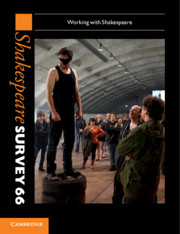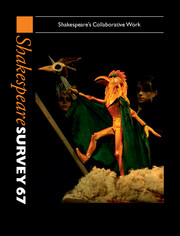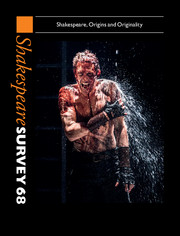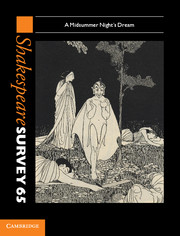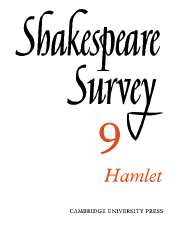Shakespeare Survey
Working with Shakespeare
Volume 66. Working with Shakespeare
Part of Shakespeare Survey
- Editor: Peter Holland
- Date Published: April 2021
- availability: Available
- format: Paperback
- isbn: 9781009013635
Paperback
Other available formats:
Hardback, eBook
Looking for an inspection copy?
This title is not currently available on inspection
-
Shakespeare Survey is a yearbook of Shakespeare studies and production. Since 1948, the Survey has published the best international scholarship in English and many of its essays have become classics of Shakespeare criticism. Each volume is devoted to a theme, or play, or group of plays; each also contains a section of reviews of that year's textual and critical studies and of the year's major British performances. The theme for Volume 66 is 'Working with Shakespeare', and Tiffany Stern's essay has been selected by the Medieval and Renaissance Drama Society for its Barbara Palmer/Martin Stevens award for best new essay in early drama studies, 2014. The complete set of Survey volumes is also available online at http://www.cambridge.org/online/shakespearesurvey. This fully searchable resource enables users to browse by author, essay and volume, search by play, theme and topic and save and bookmark their results.
Reviews & endorsements
'Tiffany Stern's essay, 'Sermons, Plays and Note-Takers: Hamlet Q1 as a 'Noted' Text', reads like an especially well-written and deftly plotted mystery novel. Taking as her subject the so-called 'bad quarto' of Hamlet, Stern leads the reader through a thoroughly documented and totally compelling rethinking of Q1's origins. [She] persuasively argues that this text is the product of a note-taking scribal audience who employed contemporary notational habits to produce a 'pirated' text for publication … [She] brings to life a new world of early modern performance through descriptions and details that offer many small openings onto the textual culture of the period … this essay not only offers a significant reassessment of Hamlet Q1, but also makes a claim for the cultural importance of note-taking practices in the early modern period more generally.' Medieval and Renaissance Drama Society
Customer reviews
Not yet reviewed
Be the first to review
Review was not posted due to profanity
×Product details
- Date Published: April 2021
- format: Paperback
- isbn: 9781009013635
- length: 485 pages
- dimensions: 246 x 187 x 24 mm
- weight: 0.93kg
- contains: 39 b/w illus.
- availability: Available
Table of Contents
1. Sermons, plays and note-takers: Hamlet Q1 as a 'noted' text Tiffany Stern
2. Equivocations: reading the Shakespeare/Middleton Macbeth Cordelia Zukerman
3. The date of Sir Thomas More Hugh Craig
4. Filming 'the weight of this sad time': Yasujiro Ozu's rereading of King Lear in Tokyo Story (1953) Reiko Oya
5. Cursing to learn: theatricality and the creation of character in The Tempest David Schalkwyk
6. Like an Olympian wrestling Richard Wilson
7. 'Doing Shakespeare': how Shakespeare became a school 'subject' Janet Bottoms
8. (Mis)advising Shakespeare's players Michael Cordner
9. Making the work of play Michael Pavelka (in conversation with Carol Chillington Rutter)
10. 'On the wrong track to ourselves': Armin Senser's Shakespeare and the issue of artistic creativity in contemporary German poetry Tobias Döring
11. 'What country, friends, is this?': Cultural identity and the World Shakespeare Festival Stephen Purcell
12. Redefining knowledge: an epistemological shift in Shakespeare studies Péter Dávidházi
13. Shakespeare as presentist John Drakakis
14. Greater Shakespeare: working, playing and making with Shakespeare Hester Lees-Jeffries
15. 'A joint and corporate voice': re-working Shakespearean seminars Scott L. Newstok
16. Shakespeare and the cultures of translation Ton Hoenselaars
17. Shakespeare's inhumanity Kiernan Ryan
18. Making something out of 'nothing' in Shakespeare R. S. White
19. 'A book where one may read strange matters': en-visaging character and emotion on the Shakespearean stage Michael Neill
20. 'Hear the ambassadors!': Marking Shakespeare's Venice connection Carol Chillington Rutter
21. 'O, what a sympathy of woe is this': passionate sympathy in Titus Andronicus Richard Meek
22. Who drew the Jew that Shakespeare knew?: Misericords and medieval Jews in The Merchant Of Venice M. Lindsay Kaplan
23. 'Imaginary puissance': Shakespearean theatre and the law of agency in Henry V, Twelfth Night and Measure For Measure Erica Sheen
24. Hamlet and empiricism James Hirsh
25. 'Let me see what thou hast writ': mapping the Shakespeare–Fletcher working relationship in The Two Noble Kinsmen at the Swan Varsha Panjwani
26. Shakespeare performances in England (and Wales) 2012 Carol Chillington Rutter
27. Professional Shakespeare productions in the British Isles, January-December 2011 James Shaw
28. The year's contribution to Shakespeare studies:
1. Critical studies reviewed by Charlotte Scott
2. Shakespeare in performance reviewed by Russell Jackson
3. Editions and textual studies reviewed by Sonia Massai.-
General Resources
Find resources associated with this title
Type Name Unlocked * Format Size Showing of
This title is supported by one or more locked resources. Access to locked resources is granted exclusively by Cambridge University Press to lecturers whose faculty status has been verified. To gain access to locked resources, lecturers should sign in to or register for a Cambridge user account.
Please use locked resources responsibly and exercise your professional discretion when choosing how you share these materials with your students. Other lecturers may wish to use locked resources for assessment purposes and their usefulness is undermined when the source files (for example, solution manuals or test banks) are shared online or via social networks.
Supplementary resources are subject to copyright. Lecturers are permitted to view, print or download these resources for use in their teaching, but may not change them or use them for commercial gain.
If you are having problems accessing these resources please contact [email protected].
Sorry, this resource is locked
Please register or sign in to request access. If you are having problems accessing these resources please email [email protected]
Register Sign in» Proceed
You are now leaving the Cambridge University Press website. Your eBook purchase and download will be completed by our partner www.ebooks.com. Please see the permission section of the www.ebooks.com catalogue page for details of the print & copy limits on our eBooks.
Continue ×Are you sure you want to delete your account?
This cannot be undone.
Thank you for your feedback which will help us improve our service.
If you requested a response, we will make sure to get back to you shortly.
×
